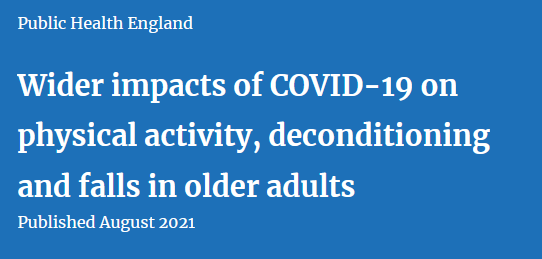Public Health England has published a report on the wider impacts of COVID-19 on physical activity, deconditioning and falls in older adults. The study modelled the likely effect of the decrease in strength and balance activity observed during the pandemic on people who experience a fall, the number of falls and associated health and social care costs.
Key findings
Some of the key findings were:
- 32% of older people were inactive between March to May 2020. This has increased from 27% in the corresponding period in 2019;
- average duration of strength and balance activity decreased from 126 to 77 minutes per week, with the greatest change in the 70 to 74 age group;
- without mitigation, modelling predicts that 110,000 more older people (an increase of 3.9%) are projected to have at least one fall per year as a result of reduced strength and balance activity during the pandemic.
Public Health England
Wider impacts of COVID-19
Published August 2021
Key recommendations
The report makes recommendations on 2 levels – those intended for the whole population and more targeted action. Targeted recommendations are aimed at individuals whose reduced physical activity has led to appreciable functional loss, transition towards frailty or new fear of falling as well as individuals with post-COVID-19 syndrome.
Key recommendations for the whole population include: promotion and increased availability of strength and balance activity for older adults; ensuring that physical activity recovery measures reach those who stand to benefit most from them; and identifying locally which older adults have reduced their levels of physical activity during the COVID-19 pandemic, with a focus on populations where the largest reductions are likely to be found.
Key recommendations for the targeted population: referral of older adults with functional loss; transition towards frailty or fear of falls resulting from deconditioning to appropriate rehabilitations services; and raising awareness amongst health and social care staff of post-COVID-19 syndrome.
Read the full report. (opens PDF document)

